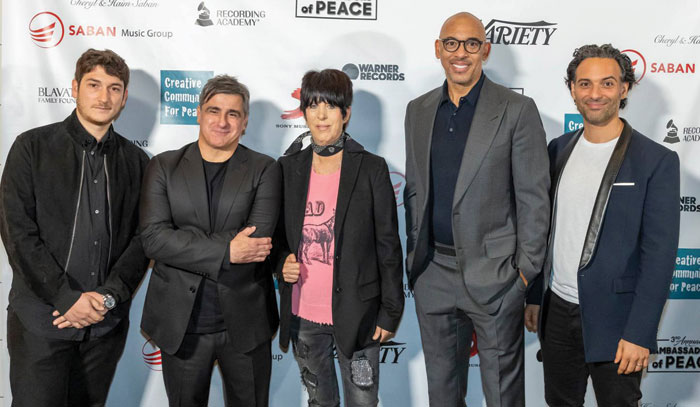
On a recent October evening, hundreds of music industry influencers gathered in Beverly Hills to talk Israel, peace and music at an event that Creative Community for Peace (CCFP) put together. For the last decade, CCFP has been leading a mission to provide balance to discourse and correct misinformation about Israel in the entertainment industry.
At the October 7 event, CCFP honored a few powerful voices in music today, praising their work in not losing sight of the big picture that music plays in affecting people — ultimately dubbing them “Ambassadors of Peace.”
Twelve-time Academy Award-nominated songwriter Diane Warren was one of the honorees.
In addition to co-writing hit film songs like “I Don’t Want To Miss A Thing” and “Nothing’s Gonna Stop Us Now,” Warren is a proud Israel advocate. She told the Journal that even though she hasn’t been to Israel in 12 years (where she was a guest of Shimon Peres), she would do anything she could to help the country. As a vegan for many years, Warren likened “standing up for the voiceless and protecting the innocent lives” to not only treating animals with care and respect, but also treating our fellow humans the same.
Another honoree, Ben Maddahi, spoke about changing harmful narratives about Israel that pervade the entertainment industry. As the Senior Vice President of Artists and Repertoire (A&R) for Columbia Records, he talked about encounters with “celebrities and influential figures spreading misinformation, sometimes unknowingly, and sometimes knowingly, about Israel.”
He said in his acceptance speech that it felt like the whole world had turned on him in regards to Israel. But what gave him hope was that people in CCFP made phone calls to celebrities and influential figures to make sure they understood the ramifications of their social media posts.
“CCFP does critical work to teach people in the entertainment industry about the truth about what’s happening in Israel,” Maddahi said. “We need to rebalance the narrative because right now, it’s one sided and extremely poorly informed.”
CCFP Director Ari Ingel told the audience that their work is critical in these times.
“Antisemitism is back,” he said. “But I guess it never really left. When things go bad, [antisemitism is] the first thing to come back. There has been a surge an antisemitic crime in Los Angeles over the last year. Just speaking up and speaking out against any hatred I think is important and has a snowball effect. You don’t realize the snowball effect it has. It’s incumbent upon all of us in the entertainment community to not stay silent anymore.”
One of the co-founders of CCFP, David Renzer, told the Journal that what they’re doing is energizing the entertainment industry to unite and taking a stand against antisemitism.
“It’s part of our mission to provide balance to the discourse,” he said. “We’re talking to Spotify, SoundCloud, iTunes and YouTube on a weekly basis to point out issues where there might be antisemitic content. We’re talking to film and television companies if there are issues there. In the last year and a half, many executives from various companies have reached out to us because they have been concerned.”
One of the most powerful messages of the evening came in the acceptance speech of the CEO of The Recording Academy, Harvey Mason Jr. He spoke about promoting art to advance peace.
“Like so many times throughout history, when the world has felt anguish and pain, music has been the medicine,” he said. “When we felt isolated, music brought us together.”
Mason also discussed an unsolicited email he received from an Iranian musician, Mehdi Rajabian, who had been put in jail for working with a woman. Upon being released, he then made another record with female singers, telling Mason that he would possibly face going back to jail. He wanted to get this music out so the world could hear it.
“[Music] is a shared language spoken and heard by people who otherwise may have nothing in common.” — Harvey Mason Jr.
“I helped him release it [and] I share his goals,” Mason said. “[Music] is a shared language spoken and heard by people who otherwise may have nothing in common. When any two people realize that they may be more alike than different, whether it’s an artist, or fans standing right next to each other, moving to the same beat, that’s where the understanding happens.”


































 More news and opinions than at a Shabbat dinner, right in your inbox.
More news and opinions than at a Shabbat dinner, right in your inbox.